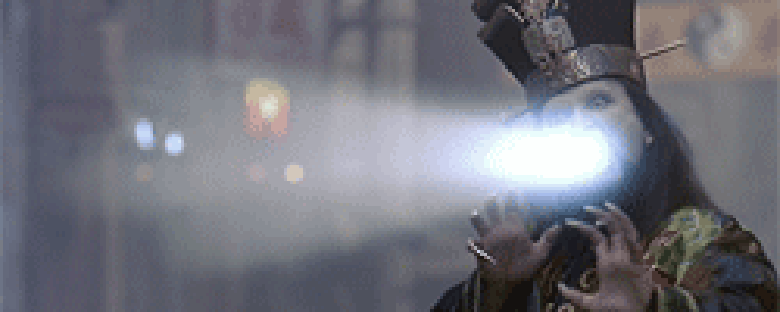Reviews
John Carpenter
USA, 1986
Credits
Review by Rumsey Taylor
Posted on 30 September 2006
Source Fox DVD
Related articles
Features: 31 Days of Horror
—Jack Burton
Jack Burton is the proprietor of his own legend, and to no one is he as capable, efficient, threatening, or cultured as he is to himself. As such, he’s anomalous amongst other heroes (and heroines) in John Carpenter’s films, most of whom are also played by Kurt Russell. Russell is here a parody of himself, the stoic determination that characterizes his MacReady (in The Thing) and the fierce capability of his Snake Plissken (in Escape from New York) is retained, only so pronounced it renders his Jack Burton a caricature of the older heroes, and not for an instant do you take him seriously. “Ready?” he counters in preparation to infiltrate an underground lair in Chinatown, “I was born ready.” It is at this moment that you realize Jack Burton’s plight will only grow more ridiculous.
The same applies to Big Trouble in Little China in whole, which some twenty years after its initial release remains difficult to posit firmly within Carpenter’s career. For one, it’s certainly not a singular genre film, whereas Carpenter’s others are nearly archetypal genre efforts. A meld of action, horror, comedy, romance, and even wuxia, this film isn’t adequately housed by any single, familiar category. “We take what we want and leave the rest,” says the magician Egg Shen of his culture. “Like your salad bar.” His observation describes the distinctiveness of the film.
Its distinctiveness is the result of how incessantly different genre elements are force-fitted into the puzzle. The opening third is a succinct example: Jack Burton, refusing to postpone the payment of a substantial gambling debt, taxis his friend Wang to the airport to greet his fiancé. Upon her arrival at the gate, she is immediately kidnapped by some punks whom Jack and Wang follow into Chinatown. And immediately upon their arrival there, they come upon a sort of gang war between the Chang Sings (good) and the Lords of Death (not good) in the district’s alleyways, which is interrupted by Lo Pan — a supernatural mystic striving for mortality — and his trio of near-equally supernatural henchmen, the Three Storms: Thunder, Lightning, and Rain. Jack and Wang retreat in fear, Wang vowing to rescue his fiancé and Jack to find his stolen rig.
The conflict is simple enough: Jack and Wang must strive to reclaim their stolen properties. But this is established with such wild mayhem that the remainder of the film promises to deliver further highlights on all accounts: more warring between the Chang Sings and Lords of Death, more sinister cackling from Lo Pan, more elemental violence from the Three Storms, and more self-validating monologues from Jack Burton. Add to this some espionage, a few monsters, and a gang of what I suppose are female ninjas, and you have one of the most frantically inspired movies ever made.
As decidedly derivative as Big Trouble in Little China is in its characterizations — and there are a few I’ve not mentioned, such as Gracie Law, the precocious Nancy Drew clone — its plot remains inventive. Jack Burton warms up to Gracie Law the minute he lays eyes on her, and spends much of the film approaching her with useless pickup lines. It is expected that they will end up together; that they don’t — remarkably, by Jack’s decision — is a disappointment given the viewer’s expectations, but that the film doesn’t oblige such expectations is telling of its ingenuity.
My favorite of the film’s ingenious genre staples persists to be Jack Burton’s hero. Coated in a fresh layer of sweat and his muscles sharp, he’s appropriate on the film’s illustrated poster, leading the Drew Struzan-drawn collage of characters with the same leadership as Luke Skywalker on Struzan’s poster for Star Wars. But as commanding and svelte as he is, it’s as if he’s in the wrong film entirely. Once he and Wang free the prisoners in the underworld, Jack Burton begins formulating his plan for escape immediately, encroaching upon corridor corners with a poised TEK-9—that this weapon is of no utility in maintaining their discretion doesn’t seem to occur to him. Having neared their exit, he carefully slides a warehouse door and peeks through, only to find the Lords of Death in their entirety on the other side staring straight at him. “We may be trapped,” he says with commanding urgency. It is as helpful and obvious as anything Jack Burton says in the entire film.
We don’t do comments anymore, but you may contact us here or find us on Twitter or Facebook.



